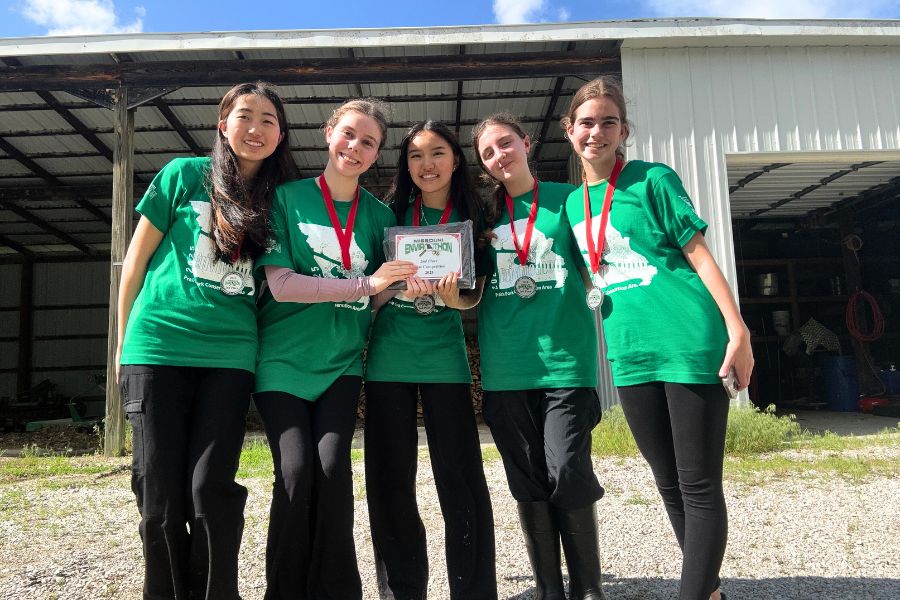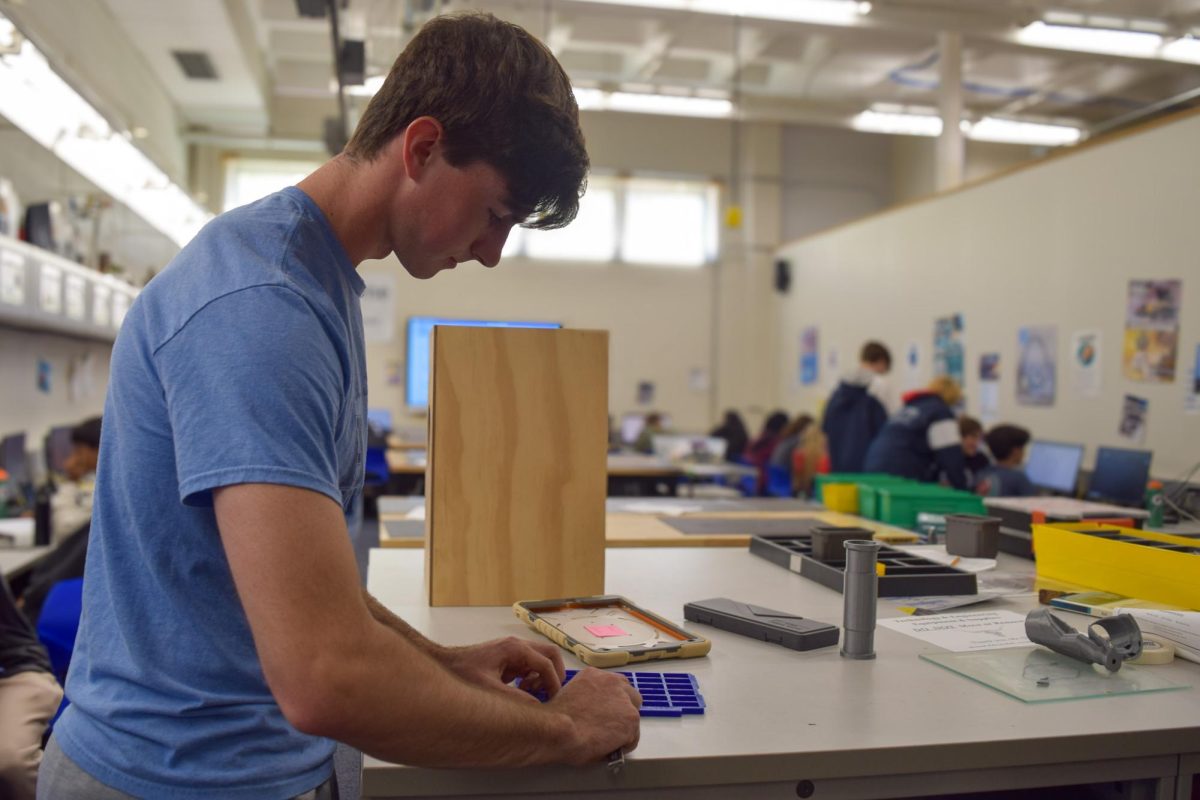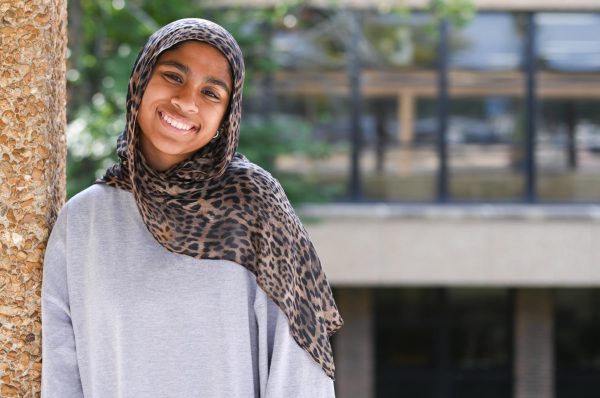Surrounded by adult and young troop leaders, sophomore Isaiah Meese took to the stage on Sept. 15 to receive the coveted, sparkling silver badge of honor. The event marked Meese’s achievement of the highest rank a Scout can be awarded: his certification as an Eagle Scout.
Meese is a member of Troop 631; chartered from St. Mark’s Presbyterian Church located in Ballwin, Miss. Meese grew up involved in several Boy Scout camps and later realized he wanted to start the journey of becoming an official Scout.
“I originally joined scouting because my parents put me into the club,” Meese said. “Eventually, after we got through [quarantine], I went on some camping trips [as a Scout] and I had fun. A couple of things that made me want to do [scouting] were the rank achievements to get the Eagle [badge].”
While being a Scout, Meese learned an endless amount of effective communication and leadership skills. The role requires significant contributions to the community and, most importantly, a focus on upholding citizenship.
Boy Scouts are given the opportunity to show their citizenship within the community, but also at school. For example, Meese worked on a community service project at Audubon Center at Riverlands to help get rid of non-native plants and contribute to the army community. In school, Meese also works on daily acts of service to uphold his citizenship.
“[At school] I try to help out where I can because we have a motto: do a good [deed] daily and be prepared. I try to show these slogans wherever I can in the community and at my school,” Meese said.
Soon enough, Meese grew interested in taking the principles learned from scouting to the next level: Eagle Scout recognition. For Meese to be able to get the Eagle Scout badge, he first had to complete a series of requirements: completing service projects, earning merit badges and learning different life skills.
“There are different requirements you have to complete to become an Eagle Scout. There are different service projects that you do; one of which is completely planned, reported, and organized. You have to learn a variety of different merit badge skills such as fire, building, cooking, and life skills to learn about citizenship,” Meese said.
The certification requires experience with a lot of leadership positions and a significant amount of badges earned for achievements. Despite the hardships of accomplishing the requirements, Meese decided to take the next step and put effort into getting recognized.
“It’s not an easy journey, but it is fun and rewarding,” Meese said. “It took me about two years and I was very slow. I’m glad I eventually did start doing it, but I regret that I wasn’t doing it at [an earlier] time. It might not always seem like the best [or] the most rewarding thing, but if you do it and you put your time into it, there’s a good chance you’ll get quite a lot out of it; whether that’s friends, new activities and hobbies or if you’re getting just more experience so that you’re prepared [for challengers].”
Most importantly, throughout the experience of becoming an Eagle Scout, Meese was able to develop strong relationships. Freshman Max Chung met Meese through Boy Scouts and quickly developed a strong bond of trust with him. While working alongside Meese, he noted an evident skill in leadership.
“[Meese is] devoted to ensuring people understand things to the fullest extent. When I’m camping with him, he [makes] sure everyone else is set up and taken care of before he does anything for himself,” Chung said.
As for Meese, the experience led him to foster a significant community outside of the school setting. Above all, his primary motivation throughout the extensive process was the people that surrounded him.
“[Scouting] eventually became a family [factor] for me. Everyone there [cared] for me. At some point, I was enabling myself to take care of the rest of them, trying to teach them more skills [and] being able to help them through their struggles,” Meese said. “It’s a place where we’re all just there to help people grow and become better leaders [and] better people in the community.”

![Sophomore Isaiah Meese smiles after his Eagle Scout Ceremony. Meese has participated in the scouting program since first grade, learning new aspects of life and growing a community of a second family. “I almost didn’t do [boy scouting], but I'm glad I eventually did start doing it. I regret that I wasn't [working towards Eagle Scout during COVID]. It might not always seem like the most rewarding thing, but if you put your time into it, there's a good chance you'll get quite a lot out of it: friends, new activities and hobbies, or just more experience,” Meese said.](https://pwestpathfinder.com/wp-content/uploads/2024/10/IMG_1004-1200x800.jpg)

![Focused on providing exceptional service, sophomore Darsh Mahapatra carefully cleans the door of a customer’s car. Mahapatra has always believed his customers deserve nothing less than the best. “[If] they’re trusting us with their car and our service, then I am convinced that they deserve our 100 percent effort and beyond,” Mahapatra said.](https://pwestpathfinder.com/wp-content/uploads/2025/10/DSC_0018-1200x800.jpg)
![Sophomore Aleix Pi de Cabanyes Navarro (left) finishes up a soccer game while junior Ava Muench (right) warms up for cross country practice. The two came to Parkway West High School as exchange students for the 2025-2026 school year. “The goal for the [exchange] program is to provide opportunities for both Parkway students and our international exchange students to learn about other cultures, build connections and become confident, capable, curious and caring — Parkway’s Four C’s — in the process,” Exchange Program Lead Lauren Farrelly said.](https://pwestpathfinder.com/wp-content/uploads/2025/10/Feature-Photo-1200x800.png)

![Gazing across the stage, sophomore Alexis Monteleone performs in the school theater. The Monteleone family’s band “Monte and the Machine” has been releasing music since 2012, but Alexis started her own solo career in 2024 with the release of her first single, Crying Skies. “My whole family is very musical, [and I especially] love writing [songs with them],” Monteleone said.](https://pwestpathfinder.com/wp-content/uploads/2025/09/DSC7463-1200x798.jpg)
![Amid teaching a lesson to her AP Calculus BC class, Kristin Judd jokes alongside her students in their funny remarks. Judd has always enjoyed keeping the mood light in her classroom, along with on the volleyball court. “[I enjoy] that side talk where you see [or] overhear a conversation and chime in, or somebody says something funny,” Judd said.](https://pwestpathfinder.com/wp-content/uploads/2025/09/image-1200x730.jpg)
![Eyeing the ball, junior Ella McNeal poses for her commitment pictures at Clemson University. McNeal’s commitment comes after months of contact with top Division 1 soccer programs. “ It has taken a lot to get to where I am, but I know that [what] I've already been through is just the beginning, and I can't wait for what is to come,” McNeal said.](https://pwestpathfinder.com/wp-content/uploads/2025/09/IMG_4926-1200x900.jpeg)


![Senior Adam Zerega stands with senior Dexter Brooks by farm equipment. Zerega often worked with friends and family on his farm. “I've been able to go to my family's farm since I was born. I [spend] at least three weekends a month [on the farm], so I'm there all the time,” Zerega said.](https://pwestpathfinder.com/wp-content/uploads/2025/04/IMG_4872-1200x900.jpg)

